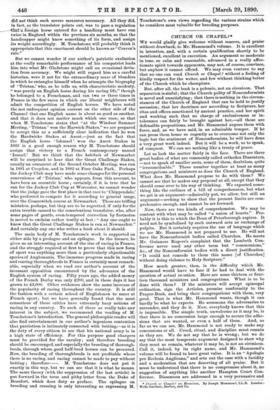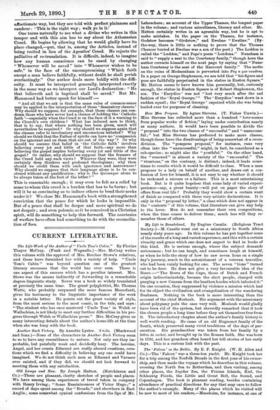CHURCH OR CHAPEL?* WE would gladly give welcome without reserve,
and praise without drawback, to Mr. Hammond's volume. It is excellent in intention, and, with a certain qualification shortly to be mentioned, excellent in execution. An argument so moderate in tone, so calm and reasonable, advanced in a really affec-
tionate spirit towards opponents, may not, of course, convince, but anyhow it cannot offend. We may even venture to say that no one can read Church or Chapel ? without a feeling of kindly respect for the writer, and few without thinking better of the Church which he champions.
But, after all, the book is a polemic, not an eirenicon. That separation is sinful; that the Church polity of Nonconformists is novel and unsatisfying ; that there is nothing in the circum- stances of the Church of England that can be held to justify secession ; that her doctrines are according to Scripture, her rites and offices sanctioned by ancient practice, and her spirit and working such that no charge of exclusiveness or in- tolerance can fairly be brought against her,—all these are defensible propositions, and Mr. Hammond argues them with force, and, as we have said, in an admirable temper. If he can press them home so cogently as to overcome not only the logic but the sentiment of Nonconformists, he will have done a very great work indeed. But it will be a work, so to speak, of conquest. We can see nothing like a treaty of peace.
Let us look the matter fairly in the face. There are three great bodies of what are commonly called orthodox Dissenters, —not to speak of smaller sects, some of them, doubtless, quite " irreconcileable." These number together at least as many congregations and ministers as does the Church of England. What does Mr. Hammond propose to do with them P We cannot see that he makes any proposal at all, except that they should come over to his way of thinking. We expected some- thing like the outlines of a bill of comprehension, but what we get is an argument—admirably put, we allow, but still an argument—seeking to show that the present limits are com- prehensive enough, and cannot be set forward.
Now, there are two kinds of comprehension. We may be content with what may be called "a union of hearts." Pro- bably it is this to which the Dean of Peterborough aspires. It need not be symbolised by such outward acts as exchange of pulpits. But it certainly requires the use of language which we see Mr. Hammond is not prepared to use. He will not have the Nonconformist bodies called Churches. He meets Mr. Guinness Rogers's complaint that the Lambeth Con- ference never used any other term but " communions," &c., of the Nonconformist bodies with a direct justification. " It could not concede to them this name [of Churches] without doing violence to Holy Scripture."
How much greater, then, is the difficulty which Mr. Hammond would have to face if he had to deal with the question of actual re-union. Here are some thirteen or four- teen thousand ministers and congregations. What is to be done with them? If the ministers will accept episcopal ordination, sign the Articles, promise conformity to the Prayer-Book, and bring their congregations with them, very good. That is what Mr. Hammond wants, though it can hardly be what he expects. He summons the adversaries to surrender, and they do it. Now, everybody knows that this is impossible. The simple truth, unwelcome as it may be, is that there is no concession large enough to secure the adhe- sions that are wanted, or even a half of them. And, as far as we can see, Mr. Hammond is not ready to make any concessions at all. Creed, ritual, and discipline must remain as they are. We do not say that he is wrong ; but we do say that the most temperate argument designed to show why they must so remain, whatever it may be, is not an eirenicon. Call it, indeed, by its right name, and Mr. Hammond's volume will be found to have great value. It is an " Apologia pro Ecclesia Anglicana," and sets out the case with a lucidity and a moderation that are deserving of all praise. But it must be understood that there is no compromise about it, no suggestion of anything like another Hampton Court Con- ference. Dissenters are addressed in a very persuasive and
• Church or Chapel ? an Eirenicon. By Joseph Hammona, LL.B. London : Wells Gardner, Barton, and Co. affectionate way, but they are told with perfect plainness and
candour : This is the right way ; walk ye in it.'
One tarns naturally to see what a divine who writes in tfiis temper and with this aim has to say about the Athanasian Creed- He begins by allowing that he would gladly have its place changed,—put, that is, among the Articles, instead of being recited in lieu of the Apostles' Creed. He rejects the palliative of re-translation. It is difficult, indeed, to imagine how any human conscience can be eased by changing " Whosoever will be saved" into " Whosoever wishes to be safe," in the face of the uncompromising " Which faith except a man believe faithfully, without doubt he shall perish everlastingly." Our author deals more boldly with the diffi- culty. It must be interpreted generally, interpreted exactly in the same way as we interpret our Lord's declaration : " He that believeth and is baptised shall be saved." But Mr. Hammond had better speak for himself :—
" And all that we ask is that the same rules of common-sense may be applied to the interpretation of these damnatory clauses.' Why should we suppose, for example, that these clauses can con- demn those who have never had a chance of holding the Catholic faith '—especially when the Creed is on the face of it a warning to the Church's own children ? What has induced men to think, that is to say, that where nothing has been given, much will nevertheless be required ? Or why should we suppose again that the clauses refer to involuntary and unconscious unbelief ? Why should we think that the Father of spirits can have no compassion on the ignorant and on them that are out of the way' ? Or why should we assume that belief in `the Catholic faith' involves believing every jot and tittle of that faith—any more than believing the gospel implies believing every jot and tittle of the gospel ? Or rather, why should we suppose that the framers of the Creed held any such views ? Whoever they were, they were certainly deep thinkers and profound theologians; why then should we credit them with such ignorance and narrowness ? Why should we suppose that their language alone is to be con- strued without any qualification ; why is the Quicunque alone to be always taken at the foot of the letter ? "
This is reasonable enough ; it may even be felt as a relief by some to whom this creed is a burden that has to be borne ; but will it be so convincing as to induce others to bend their necks ender it ? We close Mr. Hammond's book with a strengthened conviction that the peace for which he looks is impossible.
But of a peace that shall be deeper and more spiritual we do not despair ; and even polemic, so it be conceived in a Christian spirit, will do something to help this forward. The courtesies of warfare have often had something to do with the reconcilia- tion of foes.







































 Previous page
Previous page